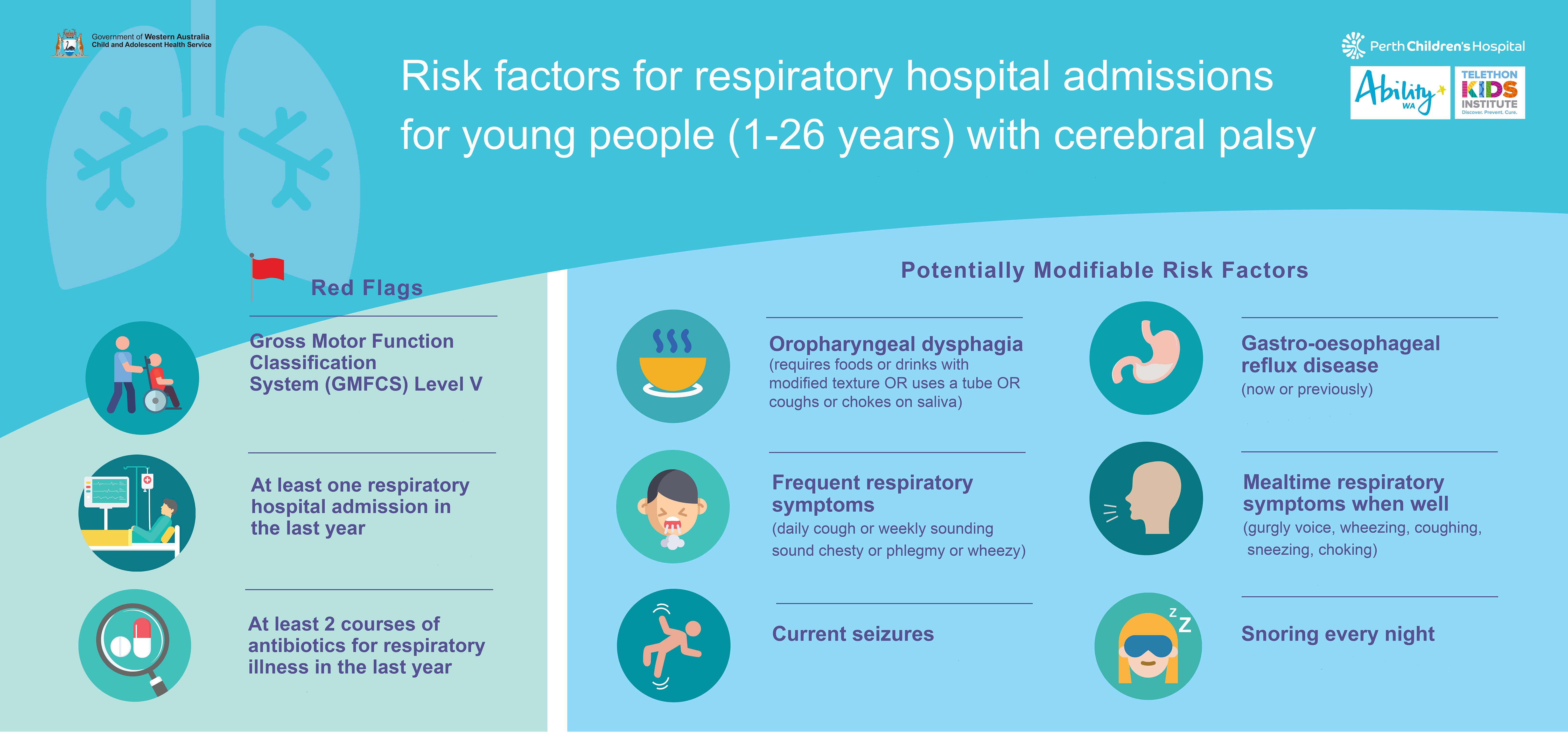Are individuals with cerebral palsy vulnerable to serious respiratory disease?
Cerebral palsy is not a respiratory disease like cystic fibrosis or asthma, and many children and adults with cerebral palsy live their lives without serious respiratory disease. But some children and adults with cerebral palsy can develop respiratory disease that becomes life-threatening and requires hospital admission.
We know from research that the risk of death from respiratory disease is 14 times higher for adults with cerebral palsy than for other adults. Respiratory disease is the most common cause of premature death in children and young people with cerebral palsy and one of the main causes of hospitalisation.
This is not reason to be alarmed but it is important to be well-informed and aware of the symptoms of respiratory disease. The more we understand about respiratory disease in kids with cerebral palsy, the better we will be at detecting it and treating it as early as possible. It’s important for families and clinicians to know what to look for, talk about their concerns, and plan how to manage them.
Our researchers have worked with children and young adults with cerebral palsy and their families, doctors and therapists, to understand how respiratory disease develops in these kids over time and to find ways to prevent and manage respiratory disease.
Our goal is to improve respiratory health and quality of life for children with CP at risk of respiratory illness. This research helps kids with cerebral palsy to live happier and healthier lives.
Which children and young people with cerebral palsy develop respiratory disease?
It is hard to say who will develop respiratory disease but our researchers have identified early risk factors for children with CP.
This research enabled us to work out who was at risk of respiratory disease. Most of these risk factors can be managed and treated if identified in early life.
If you are a child or young person with cerebral palsy, or a family member or therapist, you can work out your own individual risk factors, using this quick, interactive online checklist.

What can be done to prevent and manage respiratory disease in children and young people with cerebral palsy?
Our team reviewed the existing research and consulted with experts on respiratory disease to work out the best course of action for managing respiratory health in people with CP.
We are currently undertaking a research trial (RESP-ACT) to see if we can help these children to better respiratory health. The following video describes what RESP-ACT is all about.
If you think your child may be at risk of respiratory disease, we would encourage you to speak with your child’s healthcare professional to better understand what their individual risk factors are, which can inform a plan for managing their respiratory health.
WA Health Excellence Awards 2023
The Cerebral Palsy Respiratory Health team was a finalist in the WA Health Excellence Awards 2023, in the category of Excellence in Research and Innovation.

Publications
Blackmore AM, Bear N, Blair E, et al. Factors Associated with Respiratory Illness in Children and Young Adults with Cerebral Palsy. J Pediatr. 2016;168:151-157.e151.
Blackmore AM, Bear N, Blair E, et al. Prevalence of symptoms associated with respiratory illness in children and young people with cerebral palsy. Dev Med Child Neurol. 2016;58(7):780-781. Full text
Blackmore AM, Bear N, Blair E, et al. Predicting respiratory hospital admissions in young people with cerebral palsy. Arch Dis Child. 2018;103(12):1119-1124. Full text
Blackmore AM, Gibson N, Cooper MS, Langdon K, Moshovis L, Wilson AC. Interventions for management of respiratory disease in young people with cerebral palsy: A systematic review. Child Care Health Dev. 2019;45(5):754-771.
Gubbay A, Blackmore AM. Effects of salivary gland botulinum Toxin-A on drooling and respiratory morbidity in children with neurological dysfunction. Int J Pediatr Otorhinolaryngol. 2019;124:124-128.
Blackmore AM, Bear N, Langdon K, Moshovis L, Gibson N, Wilson A. Respiratory hospital admissions and emergency department visits in young people with cerebral palsy: 5-year follow-up. Arch Dis Child. 2020;105(11):1126-1127.
Blackmore AM. Practicalities of a Prospective Cohort Design With Data Linkage to Understand Respiratory Health in Children With Cerebral Palsy. Sage Research Methods Cases: Medicine and Health. 2020.
Marpole R, Blackmore AM, Gibson N, Cooper MS, Langdon K, Wilson AC. Evaluation and Management of Respiratory Illness in Children With Cerebral Palsy. Front Pediatr. 2020;8:333. Full text
Gibson N, Blackmore AM, Chang AB, et al. Prevention and management of respiratory disease in young people with cerebral palsy: consensus statement. Dev Med Child Neurol. 2021;63(2):172-182. Full text
Marpole R, Langdon K, Wilson A. Gastrostomy feeding in children with severe cerebral palsy in Western Australia. Acta Paediatr. 2022;111(3):680-681.
Bear NL, Wilson A, Blackmore AM, Geelhoed E, Simpson S, Langdon K. The cost of respiratory hospitalizations in children with cerebral palsy. Dev Med Child Neurol. 2024;66(3):344-352. Full text
Marpole R, Blackmore AM, Wilson AC, et al. Can RESPiratory hospital Admissions in children with cerebral palsy be reduced? A feasibility randomised Controlled Trial pilot study protocol (RESP-ACT). BMJ Open. 2024;14(2):e076730. Full text
Marpole RM, Bowen AC, Langdon K, Wilson AC, Gibson N. Antibiotics for the treatment of lower respiratory tract infections in children with neurodisability: Systematic review. Acta Paediatr. 2024;113(6):1203-1208.
Marpole RM, Blackmore AM, Wilson AC, et al. Can RESPiratory Hospital Admissions in Children with Cerebral Palsy Be Reduced? A Feasibility Randomized Controlled Trial (RESP-ACT). J Pediatr. 2025:114755. Full text
Caird B, McGowan N, Depiazzi J, Marpole R, Gibson N. Unpacking the “Black Box” of safe respiratory physiotherapy interventions delivered in the home for children with cerebral palsy and medical complexity. Physiotherapy. 2025:101835.
